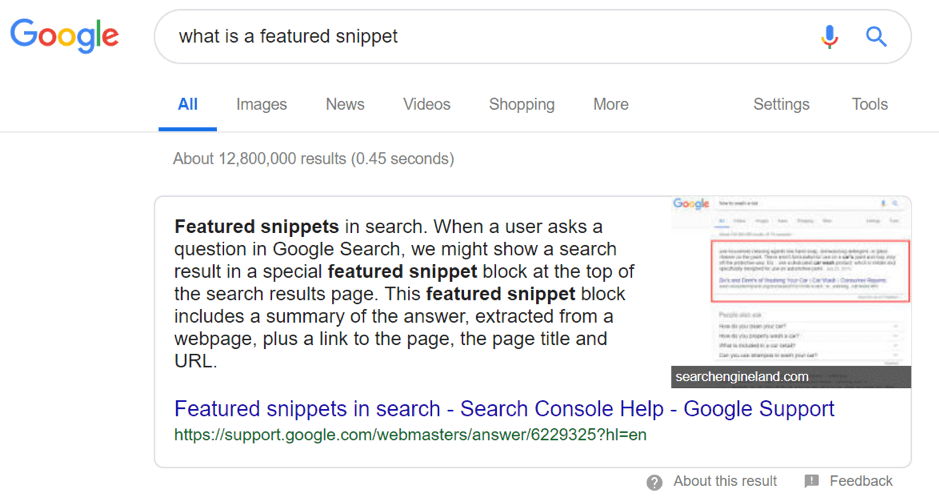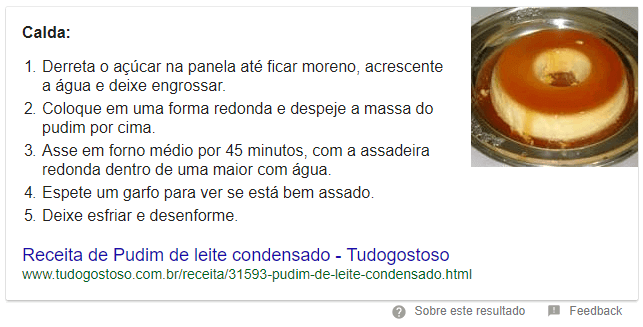Do you know that Google box that appears in the first place with a ready answer and want to know how to conquer it? So this post is for you.
Jorge always positioned himself in the first place with the main keyword of his business.
In the eyes of someone who works with SEO , or seeks success with digital marketing strategies, Jorge reached the highest point for his keyword. She was Jorge’s pride.
One day, however, when doing a search using his word, he found an unusual situation: inside a box was a summary that briefly explained the meaning of that keyword .
And worst of all … the box was positioned above Jorge’s text.
The owner of the contents of that box was ranked seventh in the SERP. But for some kind of witchcraft he was there, on top of Jorge and occupying two positions on the first page.
First place was no longer enough, now Jorge needed to conquer Google’s Zero Position.
Well, if you already came across these answer boxes called Featured Snippets you can imagine what Jorge felt.
Or, perhaps, you can imagine what Eduardo felt. He was not quoted in the story, Eduardo is the owner of the blog that was positioned in seventh place and now he has conquered the best position on the results page.
There’s also the possibility that you don’t feel like any of them, but you still have a burning desire in your heart to conquer that position, to reach the top of the results page.
It is precisely that, what you are going to learn today. We are going to break down what Feature Snippets are and how you can reach Google’s Zero position.
* My top three sources of information were: this video from Rob Bucci (CEO of STAT) , this review from Moz , and this awesome review from Ahrefs .
What are Features Snippets?
Table of Contents
Features Snippets, or answer boxes, are direct and succinct responses to a keyword search.
These boxes have the intention of directly answering the user’s search objective without necessarily having to visit a page.
Google is increasingly interested in optimizing the user experience, that is, the faster the reader reaches what they are looking for, the better. This is how the Feature Snippets or answer boxes emerged.
These Snippets appear at the top of the SERPs, above the first organic position, which is why it was nicknamed zero position.

You probably remember when you were a child and you disputed the first place in line to use a toy: “First”, “Second”, “Cerito!”.
Sure, no one accepted it.
But Google transformed the so-called “Cerito” into reality and today Snippets are as desired as the first organic position.
How do Snippets work?
What many still did not understand is how Snippets work.
Google selects, among the best positioned publications, a short and direct answer to the query sought by the user.
The criteria for selection are not yet clear, but we can identify some patterns to achieve some of those boxes.
Relationship with first place
Apparently there is no relationship between Google’s top spot and Featured Snippets. You can see that in this screenshot:
Despite that, most Snippets come from the top position. According to research by Rob Bucci’s team, of all the Snippets found, 30% come from the top of the search pages.
Which means that 70% of the other answers found come from other Google positions.
The number found by Ahrefs’ study was exactly the same.

Snippets are definitive answers to specific questions or definitions. The positioning pages, on the other hand, have different intentions: the publications are generally complete responses with a greater number of information for the user.
So there is no direct relationship between a Snippet and first place.
There is, however, a relationship to the first page! More than 99% of Snippets come from the first page.
Knowledge Graph
Some people may confuse Feature Snippets with Knowledge Graphs. Therefore, I will highlight the differences so that you can understand them.

The figure above is a Featured Snippet for search “Eiffel Tower”. See how below the definition Google quotes the source of the response reporting the link.

Now compare to this direct Knowledge Graph answer when the search was done using the keywords “Eiffel tower size”. This answer is also at the top of Google, however, it is provided by Google itself, which uses information from its own database.
Therefore, being a direct response from the search engine, it does not cite any reference.
If you see a keyword whose zero position is a Knowledge Graph, then you can be sure that you will never steal that position
Backlinks do not influence positioning
From the aforementioned studies, backlinks probably do not directly influence the definition of a Feature Snippets
Even because, in general, the publications that are best positioned tend to have a greater number of page and domain authority (whose main factor is links). And, as we already saw, the positioning of the page is not the decisive factor for the choice of Google.
Is it possible to have more than one Snippet in a post?
Yes, the same publication can appear in different Snippets.
For example, a post that has H2: “How much does an iPhone 7 cost” and “What is an iPhone 7” may appear in both searches as Snippet. That, obviously, if the post was optimized!
What is it that makes them appear and stay on top?
If backlinks and first place aren’t enough: what is it that makes Snippet appear at the top?
We have some theories. But first I must tell you that: clicking on the feedback and giving a positive evaluation is useless! When, with Conteúdo Marketing, the Portuguese version of our Content Marketing, we first appeared in a Snippet we did that in a massive way and we lost the Snippet (laughs). We get it back later! We will see that later.
Let’s go to the theories.
The first factor would be the CTR (Click Through Rate). Google evaluates whether a response is good or not by checking the number of clicks it receives. If you have a low CTR, maybe it’s because the definition isn’t that good.
Another theory (and perhaps stronger) is the CTR reduction on the page. Okay, maybe I have “buzzed” your brain right now. It seems the opposite of what I said earlier, but it is not!
Think of it this way, Google is not your friend. The intention of Snippets is precisely to reduce the click rate of your website! What Google really wants is for the user to get the answer without leaving the search page.
It’s cruel, I know that.
If it is any consolation, we have no reliable information that this is really the case.
In general, SERPs without Snippet receive clicks 74% of the time. On the other hand, on pages with Snippet the number falls just 4%, that is, 70% of the time the user clicks on a page.

Snippets also don’t have a very high click-through rate. They usually get 8% of clicks. In general, in SERPs without Snippets the first place receives almost 30% of the clicks.
I bet you didn’t expect that one. I don’t think Google either.
t wasn’t this time, Google.
Google, however, says that Snippets serve as a kind of back cover for a book. We know that this page is going to talk to us and we choose to read it or not. Read here what Google says about Snippets.
When do Snippets appear?
You will have already noticed that it is not in all searches that a Features Snippets appears. Furthermore, most SERPs do not show Snippets in their results.
So what is it that makes a Snippets appear? What triggers the trigger for Google to judge a response box necessary?
It is not possible to determine the exact factor, but we can identify a certain pattern in the behavior of the search engine.
The high search volume of a word is not a determining factor. As we will see, long tail keywords are more likely to appear in a Snippets.
On the other hand, questions, prepositions, and comparisons often appeal to Snippets.
Beyond that, much of the answer boxes appear for recipes, concepts, and lists. For example:

Featured Snippets Types
There are three different types of answer boxes. And each of them will appear in the most common way according to the search carried out. Let’s see the different types:
Paragraphs
The majority of Featured Snippets are paragraphs. Like the following example:

Snippets appear, for the most part, when it comes to questions and word definitions. But they can also appear in comparisons and prepositions.
What is it, how to do it, why, who, where, etc. These are some of the questions that usually generate answer boxes.
Lists
The second most common way to appear is through lists.
The lists appear, almost always, when it comes to recipes, rankings, step by step, something better (beaches, hotels, players, tourist spots, stadiums, etc.).
An example of a List Snippet:

Tables / tables
The last type, which usually appears less.
Generally, the table or table appears when a comparison is made, mainly of prices. But it can appear in other situations, such as movie times and even some recipes.

Benefits: why have a Snippet?
Surely you are asking yourself: Should I worry about having a Snippet or focus my efforts to be in the first place?
The answer I can give you is: both!
Focus on reaching the top and at the same time optimize your posts to get Snippets (later I’ll show you how it worked for us here at Rock Content).
Next we are going to see the main benefits of having a Featured Snippets.
Highest authority
One of the main positive factors of conquering a Featured Snippets is the credibility that your website will gain. In the end, Google considered you as the best answer to the question asked by the user in the search.
He placed you above the first position! It is as if Google said to whoever did the searching: “that’s the best answer / definition! Those guys know what they’re talking about. ”
Jump in the SERPs
You can be in ninth place and at the same time have your post above the first place.
Featured Snippets can be the simplest and fastest way of ascending on Google’s results pages.
Great opportunities for organic traffic.
Google answer boxes can be a huge opportunity for you to expand your organic traffic, especially if you are not in the top 3 of Google.
Ultimately, by appearing at the top of the page, the Snippets have great click opportunities.
Compete with giant websites
Do you know those keywords whose content you optimized, on which you made a complete content and got a lot of clicks, but did not leave the place?
Those SERPs that only have giant pages on your front like: Wikipedia, Techtudo, Globo.com, Conta Azul, etc.Balloon . com , Conta Azul, etc.
Well, Snippets can be your great opportunity to be on top of them all. If your publication is optimized so that Google finds an ideal answer in it, you have the possibility of surpassing those giants.
I’m already in the first place, why a Snippets?
That may be your mindset. “I reached the top, I don’t need to worry about Snippets.”
Well, actually, you do. According to Ahrefs’ study, the Snippets have mostly stolen first-place clicks.

In addition to being a form of attack, Snippets can defend your position and further expand the clicks you already received.
How to appear in a Featured Snippet?
Well that’s probably the main reason you’re reading this post. Despite the relevance of all the data and information that I have quoted so far, what really interests you is appearing in the answer boxes.
And if that was not what interested you, I hope I have convinced you with the previous topics.
Now, I am going to show you how to conquer that position that is currently highly desired by all those who invest in SEO and Content Marketing.
There is no secret formula. Let’s build on what Google tends to use in response.
And then I’m going to show you what worked for us.
Here we go!
What to do?
We know that Snippets are an answer or definition, for some search, that Google chooses in a “more or less” random way.
We say “more or less” because the publications are optimized to be compatible with the answer and, in this way, to be chosen. However, that does not mean that Google will choose your page and not another equally optimized one.
We will then learn to optimize our publications. Both the publications that you are still going to produce, as well as those that have already been produced but did not appear in the answer box.
Let’s see what can be optimized.
Snippet size
One of the factors that will directly influence your opportunities is related to the size of the Snippets.
If the “optimized” response is very large, Google will not want to use it, in the end the space is limited. Besides that, very small responses tend not to appear.
We will analyze the cases.
Paragraphs
For Snippets that are paragraphs the best size optimization would be approximately 45 words. This according to MOZ studies.
The largest Snippets they found was 97 words.
Well, since the study was done in English, which generally has shorter words than Spanish, we decided to look at the number of characters.
On average, Snippets are 293 characters. The largest one found was 752.
The graph below shows the percentage of Snippets of each size according to the MOZ study.

That is, try to keep your Snippets with an average between 40 and 50 words. That will surely increase your chances.
Lists
The lists have an average of 4.2 items and 10.8 words per item. It is worth taking this into account when you go to optimize your publications.
The largest list found was 8 items and the largest number of words 64. I do not recommend that you risk exceeding the number of words, in case you are interested in conquering an answer box.
Extra tip: worry more about the number of words than the number of items. Some Snippets have the tag “see more” that can extend the CTR of your page.
The bigger the better list! And try to do it with more than 8 items. In the end, if Google manages to show your entire list to Internet users, why would they click on your page?

Boards
Most of the tables are 3.6 rows and 2.5 columns, with a maximum of 9 rows and 3 columns. That is, in hypothesis, make a table with more than three columns to conquer a Snippets.
The idea is similar to that of the lists. The more lines, the better. O Features Snippets will show that there are still items to be seen by the reader.

Another important factor to keep in mind is that, in the case of the tables, Google shows how many items still remain to be displayed. In the case of iPhones, they are 2. In other cases they can be more than 100. That is, it abuses the lines and attracts more clicks.
Extra curiosity: if your website is one of those where people can search for prices, or something of that type, make those tables. Look, I did a search for “Burguer King Prices”
Note that the result is not from the Burguer King website. This happens because your content is not optimized for that. Probably if they make a board, they will steal that Snippets.
Other searches like “Outback Prices”, Mc Donalds Prices “, Subway Prices”, Applebee’s Prices “didn’t even have Snippets. In other words, Google probably did not find any optimized content.
Do you realize the opportunities that companies are missing?
PS: In the event that the person who is reading this article works in the marketing of these companies, I charge cheap for a consultancy.



